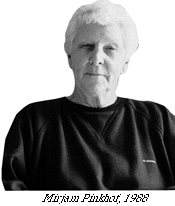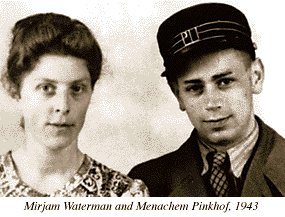
 The Green Border: As time went by the situation grew worse: more and more people wanted a hiding place, and hiding places became increasingly harder to find. At a certain point our group decided to simply try to get the children out of Holland altogether.
It was safer for them to live in the south of France than in Holland. Belgium was a little safer, but France was even better because the French had only a military occupation, while in Holland we had a much more oppressive civil occupation.
The Green Border: As time went by the situation grew worse: more and more people wanted a hiding place, and hiding places became increasingly harder to find. At a certain point our group decided to simply try to get the children out of Holland altogether.
It was safer for them to live in the south of France than in Holland. Belgium was a little safer, but France was even better because the French had only a military occupation, while in Holland we had a much more oppressive civil occupation.
Shushu found the first contacts into France; eventually we developed three routes. We discovered people--mostly smugglers--who could help you across the Belgian border. We called it going over the "green border" because you did not go on a road, or past a regular border post, but crept through the bushes and across farmers' fields--a route where there was no route. Westerweel himself took many of the kids through this border.
From Belgium they went to France, and in France there was another illegal group--all Jewish Young Pioneers--with an organization that had been set up first in Paris, and afterwards in the south of France. It worked so well that seventy of our Young Pioneers managed to cross the Pyrenees during the German occupation. They reached Spain, and from there set off on ships bound for Palestine. That was our greatest success: seventy kids reached Palestine in '44, before the war even ended.
One day Joop and another man--who, by the way, is still alive today--were taking two girls across the "green border" into Belgium. They were caught right at the border. Joop, of course, was underground, using the false identification papers of a Belgian tobacco smuggler. By that time the Gestapo knew a lot about Joop, and were looking for him. What Joop didn't know was that the man whose identity papers he was using was also being sought by the Germans. When Joop was caught on the border with the two girls, the German police looked at his papers and said, "Ah hah! We've got Le Lievre!"
Too late, Joop discovered that this Le Lievre had a record of crimes against the Nazis a mile long, including killing a German policeman. He thought they might treat him better if he told them who he really was, so he confessed to being Westerweel. But it didn't help him, and soon enough his situation became quite serious. First they took him to the local police station, then to the police station in Rotterdam, after that to the Rotterdam prison, and finally to Vught, the second concentration camp in Holland after Westerbork. In Vught he was imprisoned in a concrete bunker with no hope of escape.

Betrayal: We were able to make contact with him through another prisoner in Vught, a Doctor Steyns. Dr. Steyns, who was not Jewish, was being held for somewhat unimportant things. Because of their lack of medical personnel, the Germans allowed him certain privileges. He was scheduled to finish his sentence in just a few months, but while he was still in Vught he tried to help us as much as he could. With his help, Westerweel concocted an escape plan.
He would take special pills provided by Dr. Steyns which would make it appear that he was hemorrhaging. If, as he hoped, the Germans transferred him to the prison hospital, where security was more lax, he would try to escape from there. The first part of the plan worked, and Westerweel found himself in the prison hospital. While there he gave Dr. Steyns a letter to smuggle out to us, giving us the details of his planned escape. But somehow the Germans sniffed out something suspicious, and unexpectedly searched Dr. Steyns. They found Joop's letter, and proceeded to set a trap. They had a Dutch traitor deliver Joop's letter to the addressee Joop had written on it--a member of our group. So this Dutchman came to us with a genuine letter from our friend Joop, saying, "I'm going to help you get him out," and telling us exactly what he was going to do. That's how he infiltrated our group.
On the day we expected Westerweel to come out of prison, the traitor came to the address where I was staying, bringing the Gestapo with him. They rounded us up, and put us all in prison. At the same moment, they arrested Menachem at the railway station, where, according to the plan, he was waiting with a suitcase full of clothes for Westerweel. Menachem and I were kept handcuffed, under very heavy guard, with no possibility of escape. When we were brought to Westerbork they immediately put us in the camp prison.
Even in prison Menachem and I always had some contact with each other. We had good friends in Westerbork who tried to do whatever was possible to help us, but the only thing they could do was to have our names put illegally on the list of people being sent to Bergen-Belsen instead of Auschwitz. This may have saved us, who knows? Bergen-Belsen was a death camp too, but a certain number of Bergen-Belsen inmates were set aside for possible exchange with German POW's in Palestine, and we were on the list of people who had certificates for Palestine. Such an exchange of prisoners actually did happen once: two hundred and twenty-two prisoners left Bergen-Belsen by train bound for Palestine.

This traitor who betrayed us is still alive, living in Amsterdam today. I had a very bad feeling about him from the beginning--I didn't trust him, although the others did. That's why I always told him my whole made-up story--he never knew I was Jewish. I was living as a non-Jew with a false identity card, so it was easy. When I came to the Westerbork prison, they didn't know I was Jewish.
The prison interrogations were very, very difficult. In the end, I thought I would have an easier time as a Jewish woman, and just be sent to a camp. As a resistance worker I was afraid they would shoot me, like Joop. I had a very hard time convincing them of the fact, but finally they accepted that I was a Jew. They sent me to Bergen-Belsen, where I remained exactly one year, from April '44, until we were freed in April '45. It was a terrrible terrible year, but that's another subject. Menachem was never really healthy again after the camp. We were married in Holland when we both came back from Bergen-Belsen. That was how we ended the war.
We both knew that we could have easily saved ourselves quite early in the game. Before the resistance group was formed, Joop Westerweel said to me, "I want you both to come to me. I will help you, and look after you." I told Menachem we had a chance to be saved.
He said, "No, I need to stay here. I'm responsible for these children."
He was one of the leaders and couldn't leave them. Soon after that the idea was formed to save the whole group. We didn't want to save only ourselves; we wanted to save as many children and Jews as possible.